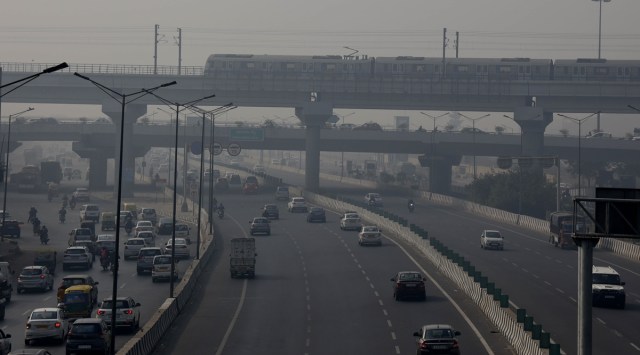Study begins on real-time sources of air pollution in Delhi
The project is being implemented by IIT Kanpur, IIT Delhi, and The Energy and Resources Institute (TERI), along with Delhi Pollution Control Committee (DPCC).
 Part of the project is a mobile lab that will collect data on pollution levels in different parts of the city. (Express Photo by Prem Nath Pandey)
Part of the project is a mobile lab that will collect data on pollution levels in different parts of the city. (Express Photo by Prem Nath Pandey) The real-time source apportionment study for Delhi which is expected to help identify the sources of air pollution in the city in real time has begun and will help Delhi take action to reduce pollution based on its findings, Chief Minister Arvind Kejriwal said on Friday.
The project is being implemented by IIT Kanpur, IIT Delhi, and The Energy and Resources Institute (TERI), along with Delhi Pollution Control Committee (DPCC). After a review meeting on the study, Kejriwal said: “We have ordered officials to immediately take action to reduce pollution based on the study’s findings. The Delhi government will place the analysis before CAQM (Commission for Air Quality Management) so the Centre, too, can act upon the problem.”
The study involves a supersite, where equipment has been set up to monitor parameters like particulate matter and other gaseous pollutants, determine sources of pollutants in real time, and generate forecasts on hourly, daily, and weekly basis.
The study involves a supersite, where equipment has been set up to monitor parameters like particulate matter and other gaseous pollutants, determine sources of pollutants in real time, and generate forecasts on hourly, daily, and weekly basis.
According to a communication from the Chief Minister’s office, the team from IIT Kanpur informed officials at the meeting that “the secondary inorganic aerosols which travel long distances contribute to a large proportion of the air pollution mix”. They identified biomass burning of wood and stubble, vehicular emissions and construction and road dust as other major sources of PM2.5 over the past month.
Kejriwal has directed the Environment Department and the DPCC to take action to identify the sources and locations of pollution based on the information that the study generates. The project was approved by the cabinet last year and an MoU was signed by the Delhi government with IIT Kanpur. Part of the project is a mobile laboratory which will collect data on pollution levels to determine their sources in different parts of the city.







